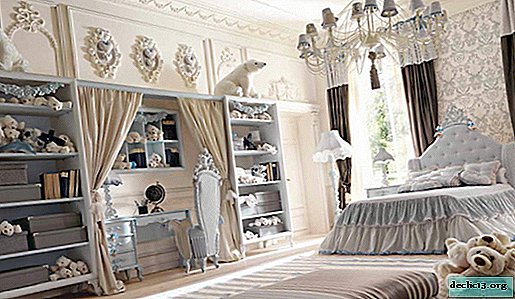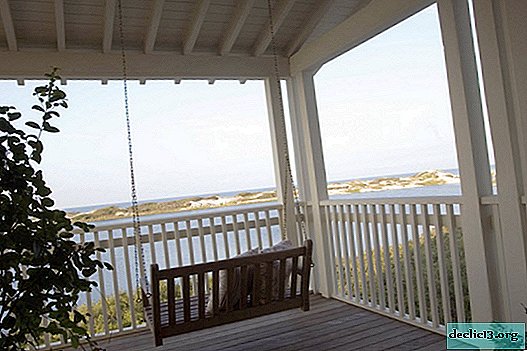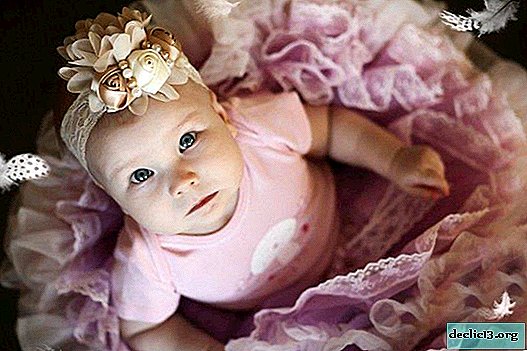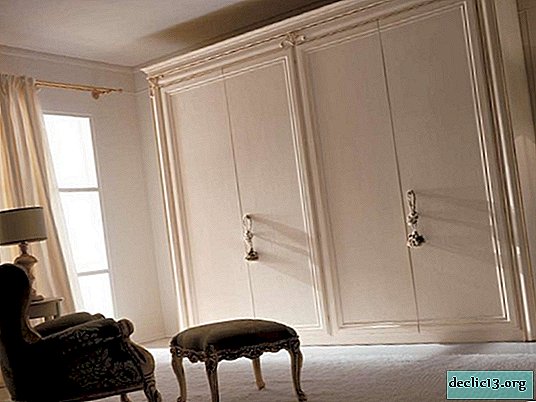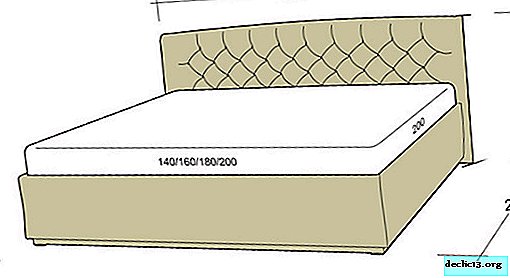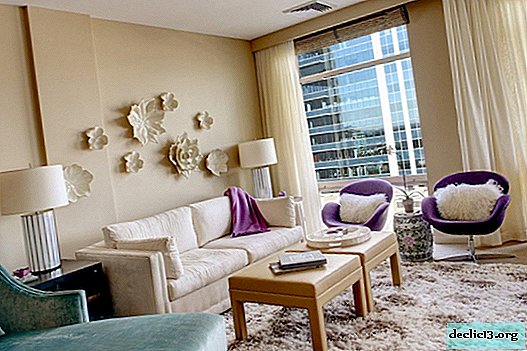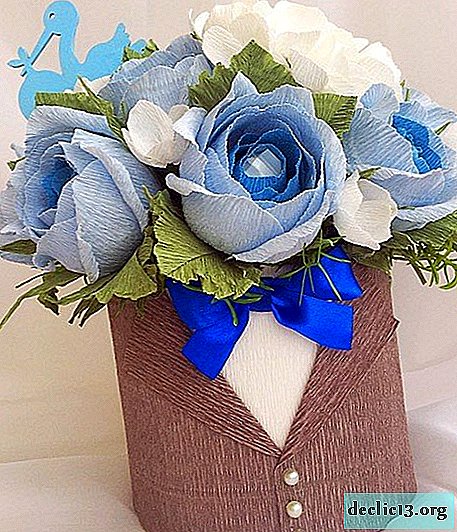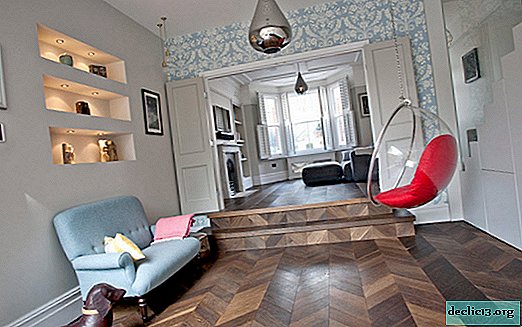Overview of built-in corner cabinets, and their features
The built-in cabinet differs from the usual one in that it is mounted to the walls. It can be partially integrated, that is, have a side wall, floor surface or roof. If it is directly attached to the wall, like a built-in corner cabinet, then the walls of the room are the supporting structural elements. Although the corner is considered not a very convenient place in the room, from the point of view of space ergonomics (convenience), but the built-in wardrobe completely violates this idea. He not only fills this part of the room, but also makes it as functional as possible.
Varieties
There are several varieties of angular structures and their classification should be considered before choosing a model in the room.
In shape
Depending on the type of furniture, this can be an element of a modular system or a separate cabinet, and models of different shapes can be found, among them:
- semicircular corner cabinets with a convex door surface;
- semicircular segment with a concave surface;
- the module, which is an element of the typesetting system, can be concave or convex. Such a cabinet has side walls to which additional elements are attached;
- g-shaped segment is a transitional element;
- built-in segment in the room diagonal angle.
The capacity of the cabinets depends on the shape and dimensions of the module.
The advantages of this furniture are that built-in wardrobes use the so-called “blind corner”, that is, a place that is difficult to fill with standard rectangular furniture. The advantage of the built-in corner segment is that the rounded elements are considered the most ergonomic, that is, the most freeing up the space of the room. The radial corner segment organically fits into different stylistic decisions, photos of such elements are presented below.
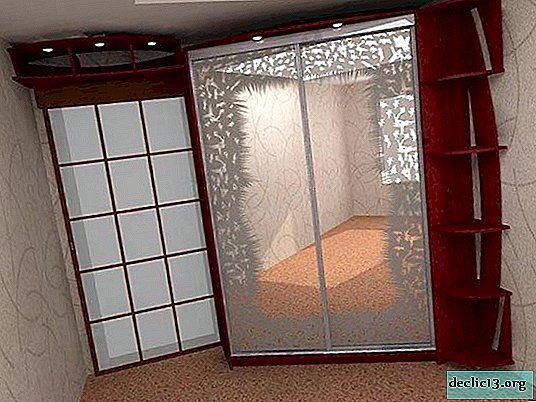 Diagonal
Diagonal Semicircular concave
Semicircular concave Semicircular convex
Semicircular convex With additional elements
With additional elementsAccording to the materials of manufacture
A distinctive feature of the corner embedded segments is that they are attached directly to the wall. This, on the one hand, ensures a perfect fit of furniture, on the other hand, saves material.
What cabinets are made of:
- MDF panels are a wood board that is made from the smallest wood chips, vacuum pressed. On its surface there may be relief patterns. At its core, it is also a tree, but has passed through the process of technological processing. MDF panels on top are coated with a special film or painted. The advantage of the material is strength, reasonable price, wide color gamut. Painted facades can be given any color, shade, MDF panels can also be bent at the right angle;
- composite materials, which consist of several components, came into fashion. Their production is based on polymerizable resins, which can be given any shape. The angular surface of the facade made of these materials is light. The load on the sliding system is reduced. Impressive variety of colors, textures and types. Such furniture looks especially impressive in a room with a minimalist style. A semicircular cupboard with composite doors looks stylish, literally transforms the space of a room;
- mirror and glass surfaces. They can only bend at a certain angle. For the manufacture of tempered glass, which does not break. The material is quite heavy, so it is divided into segments. They are inserted into the aluminum profile. Glassware is quite expensive;
- wood radial sliding systems are rare. They are laborious to manufacture, expensive in price.
The built-in sliding surface of the cabinet is mounted in an aluminum profile so that it can be inserted into the guide sliding systems. They are of two types: upper support and lower support, that is, guide rails can be mounted on top or bottom. Most furniture makers prefer a lower support system, it distributes the load better, and the doors slide apart almost silently.
 Mirror
Mirror Wooden
Wooden Chipboard
Chipboard MDF
MDFWhere can I embed
In fact, the built-in furniture can be mounted to any wall, corner. Now many houses are being built in a monolithic-frame way, which is why non-standard angles and various niches appear in the premises. Standard models are difficult to mount in such places. For built-in furniture, these problems are surmountable. It is modeled on individual sizes, fitted to walls. A cabinet, for example, in a semicircle, smooths out such problem areas. A selection of photo modules for monoliths clearly demonstrates all the advantages of corner furniture. In addition to this kind of furniture is functional, it is calculated based on the needs and dimensions of the stored things.
For small rooms with limited space, installing a semicircular segment is sometimes the only possible and rational option. For example, it can be a small hallway, where there is no wall, to establish a standard-sized wardrobe.





Dimensions
The size of the furniture is affected by the dimensions of the room, the free space in the corner, along the wall. The purpose of the cabinet is important, what will be stored in it. The minimum size of the functional corner segment must be at least 900 mm on both sides of the corner. If the area of the room is limited, then it is possible to increase the useful area of the cabinet due to semicircular systems. In this case, the radius area will be added to the corner space.
The average dimensions of small segments: width (from the angle along the wall) 950 mm, 1250 mm. In this case, it is rational to use radius doors with a convex surface. If the angular module is transitional, that is, rectangular sections will be mounted on it, then the optimal width of the attached part (side wall) is 450 mm, 600 mm. In this case, you can create a space for things that are hung on a coat hanger.
Cabinet sections of more than 1,500 mm are considered quite roomy models, which perfectly demonstrate the photos in the selection.





Filling
The internal filling depends on what kind of things the cabinet is designed for. If these are models for the hallway, then it is supposed to store seasonal things. Therefore, the standard set includes a compartment for outerwear with a barbell for a coat hanger, shelves for shoes, hats, and things.
Corner embedded segments in the bedrooms have a slightly different content. They may include:
- rod or pantograph (lowering bar for shoulders). Such a mechanism in cabinets can be oil or hydraulic (gas);
- hangers for different things;
- devices for storing accessories, ties, belts and so on;
- special holders for trousers;
- retractable laundry baskets (socks, pantyhose);
- shelves for storing seasonal items.
For built-in cabinets, manufacturers produce many different kinds of fittings. Most are made of composite or chrome materials. Retractable wicker baskets mounted on guide rails are popular.
There are built-in corner segments that are designed to store household items. Then the content will be slightly different. It is calculated based on the items that will be stored, their dimensions. This may be household appliances for the home, overall household items.





Facade selection
When choosing the facade of a built-in wardrobe, you need to start, first of all, from the purpose of the furniture, the style of the room. For built-in furniture in a small hallway, it is better to choose light colors. Cabinets must be practical, resistant to mechanical damage. The best option for the material is MDF panels, which are suitable for different styles. Samples can be seen in the photo in the selection.
The built-in module can be made of glass, mirrors. If the corner segment is a connecting module, then you can use the combined version.
A built-in wardrobe in the bedroom carries a pronounced stylistic load. It should organically fit into the interior. On the facades use various decors: photo printing, sandblasting elements, painting, fusing (glass mosaic). Variants of built-in elements can be different, concave corner elements for the most part serve as connecting structures. Convex segments carry a functional load, they are the most capacious. Sometimes they are a mini dressing room.
For stylistic decisions use different options for the design of facades. MDF panels are suitable for classics. Minimalist style gravitates to modern materials, this is, first of all, composite facades.
The built-in element in the nursery is better to order from MDF. These facades can be made of bright "fun" colors. The film coating is quite resistant to scratches, chips. Corner built-in wardrobe rational solution for the improvement of the premises.
Video
Photo





























